Werner Herzog has dragged a real-life steamship across a real-life mountain; he once pulled a gun on his longtime star collaborator Klaus Kinski and told him to act or die; he took a film crew to the lip of la Grande Soufrière, a volcano in Guadeloupe that seismologists had predicted would erupt at any moment (it didn't); he was accidentally shot in the stomach during a filmed interview with the BBC ("It is not a significant bullet") and once, aided by Californian chef Alice Waters, he cooked – with garlic and herbs – and then ate his own shoe, an event chronicled in his friend Les Blank's evocatively title docushort Werner Herzog Eats His Shoe.
These are the bedrock fables of the Herzog brand (if we may dare to dub it so in its 50th year), well known, widely shared, and that is the last I shall say of them here. The point being, the unexpected is what you expect from Werner Herzog. Co-starring in a Tom Cruise action movie, however, is exactly what you would not expect from Werner Herzog. Which means logically, I suppose, that it's exactly what you should expect. At any rate, here we are, to his surprise as much as my own, to talk of Jack Reacher, Cruise's latest thriller.
This is the second time we have met (the first was in 2007, at his austerely beautiful house on the storied Wonderland Avenue in Los Angeles), but I'm still surprised he recognises me. And that he is so warm and gracious and hospitable: "John, please, let us be seated and drink something." Perhaps he enjoys people the way I like good movies, finding them more congenial on second viewing, when all surprise has been expended. For the next hour we talk widely and rather merrily of his life, and in particular, his American life since moving here in 1995.
Jack Reacher is the first of Lee Child's novels to reach the screen, and Herzog, seen only in five or six scenes, with dead-eye contact lenses and a fingerless right hand, is the psychopathic Mister Big, a graduate of the Soviet Gulag, behind the film's central conspiracy. As he talks I am enraptured by his voice, its guttural qualities and syntax galvanising the English language from beneath, the words expectorated with a precision that enunciates every corner of every syllable, and delivered inlong, smoothly undulating sentences of essentially Germanic construction.
"I was approached by the director and Tom Cruise. They wanted me. I think it's a logical idea because I've done parts before where I played really dysfunctional and outrageous and dangerous characters, like in Harmony Korine's Julien Donkey Boy, and because of that and other films they were interested in me. And I liked them for their professionalism and commitment – things that I prize myself." I am interested to know the ratio between his paycheque for this movie and the budget of any one of his last 10 films. Was he looking around the set thinking: "Oh, I could make 10 movies for the price of this one?"
"No, the character and nature of a film is not necessarily related to the budget. And by the way, I have made bigger films myself than Jack Reacher, not in terms of money spent – money is not the best indicator of intensity. The production value – if you think of how it registers on the screen, when you look, for example, at Fitzcarraldo, there is much more production value on the screen than in most Hollywood films."
He's been more prominent as an actor in recent years, especially since his exhilaratingly funny motormouth dad role in Julien Donkey Boy. He played a fictional version of himself in Incident at Loch Ness and had a priceless guest-spot on The Simpsons as a bitter German industrialist.
"I like and I love everything that has to do with cinema, writing, directing, editing, creating music, and even acting. I just acted in a big German epic film – Heimat by Edgar Reitz. It's a very big epic – one single film that he's making for 30 years now. This one is called Die Andere Heimat – The Other Heimat. I play a very small cameo. We were looking at each other as somehow circling or completing a circle, because in one of his very early films I played a serial killer (Geschichten vom Kübelkind (1971) – Tales of a Trash-Can Kid) and half a century later I'm doing a film with him again. In other words, I have done some acting very early on in my career." (Aficionados will recall that circularity is a prominent motif in Herzog's work.)
How did you do the mangled hand? Prosthesis? "Not a prosthetic hand, no. I had a hand dooble," as he pronounces it.
Herzog, like Fritz Lang, Murnau, the Siodmak brothers and other German exiles, has now followed a distinctly German portion of his career with an American portion of no less import and greatness, and, as happened with this those earlier giants, America may not obliterate a distinctive cinematic voice, but it will always leave upon it an ineradicable imprint. Co-starring in a major Hollywood movie opposite the biggest movie star in the world was surely the farthest thing from Herzog's mind when he first visited the United States in 1963.
"I came by boat," he recalls. "I was one of the last ones coming by boat. It was very, very nice, because for 10 days you anticipate to arrive. It's a different, old-fashioned way of approaching America, like the classic immigrant, landing in New York, as I did."
He had visa problems, since his scholarship in Pittsburgh (which he revisited for the first time since to film Reacher) was tangentially related to Nasa, and security checks were suddenly needed. He dropped out and fled to Mexico and worked as a rodeo clown "because I couldn't even ride a horse" (demented details like this you don't even contest. If Herzog says it happened, I believe him), while making pocket change by smuggling. "At that time border controls were much more lax, and between the twin cities Reynosa and McAllen, Texas, over the Rio Grande, the road carried Mexican labourers who would work in McAllen and return home at night. They each had a special sticker on their windshield and so I stole one of them and I was always waved through. I earned a little extra money by bringing in TV sets without duties."
Herzog didn't film in America until he shot the second half of Stroszek in Wisconsin in 1976 (a particularly naked, fresh-peeled-eyeballs response to bicentennial America, "much based on my own experiences in Pittsburgh"), followed by several documentary shorts, each obsessed by the incantatory qualities of the American demotic. How Much Wood Can A Woodchuck Chuck? captured livestock auctioneers and their insanely fast patter while Huie's Sermon captured a black preacher in full ecstatic flow.
"I was fascinated by the outer limits of language and I would like to do Hamlet with the world champions of livestock auction because I'd like to see how does Hamlet function in under 14 minutes. And Huie's Sermon, again it's about that kind of incantation, the intensity of speech that goes into complete ecstasies. The bishop, an African-American bishop, is actually ranting against the Rolling Stones and all this immorality, and so in his regular sermon he himself actually outdoes Mick Jagger in the end! He goes completely ballistic!"
There follows a distinct chuckle at the memory and I notice that for all his reputation as a misanthropic medieval seer-monk, apparently stepped fresh off an illuminated manuscript or tapestry, with his fierce, hooded, eagle's eyes and windswept German Romantic demeanour, we have actually been chuckling quite a lot this morning.
Afterwards I corner Jack Reacher's director, Christopher McQuarrie and ask him about Herzog. He recalls a scene in which a character is shot out of a swivel chair. "Werner was on set that day and when we watched the playback he was the one who pointed to the chair, which was still waving back and forth on its axis like someone shaking their head, and ever the poetic mind, he said [he gives it his best Werner]: 'The man says yesss, but the chair says noh, noh, noh.' That's Werner – he notices shit."
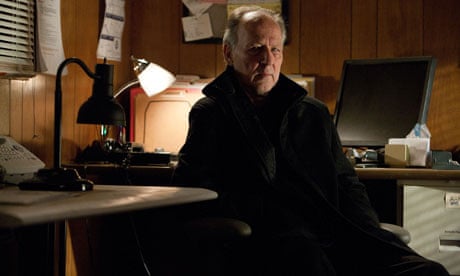
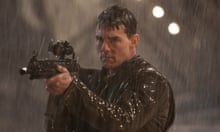
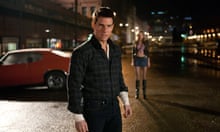
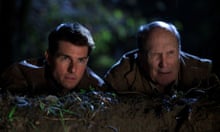
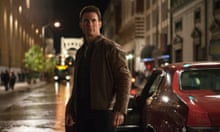
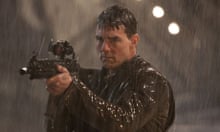
Comments (…)
Sign in or create your Guardian account to join the discussion